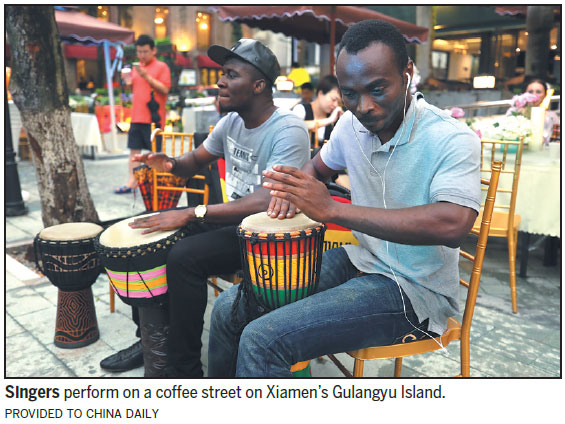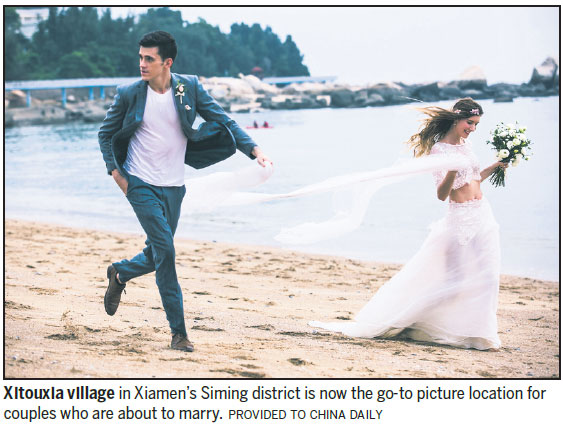

The beauty and culture of Xiamen have proved a powerful lure for lovers and artists
Shao Ye calls his establishment a store - but if it is, it is one of the strangest stores you will ever come across. For in this place, nobody buys or sells anything, the stock in trade being goodwill.
This is Nest in Xiamen, Fujian province, and Shao is one of its co-founders.
Your first inkling that this establishment is a bit unusual comes when you walk along a narrow corridor containing shelves packed with old books and paintings. Walking up the even narrower spiral staircase, you find a bright and broad roof area with a wooden tea table, fine china cups and several bonsai plants.
|
The coastal city of Xiamen in Fujian province has attracted many travelers from home and abroad. Chen Qingqiang / For China Daily |


Here we have a gleaming example of the sharing economy, a bit of space in the city where anyone is welcome to relax, drink tea or coffee, chat and read, without handing over so much as a jiao, unless they feel inclined to make a donation.
Shao says that since the "store" opened in 2014, visitors have not taken a single thing out of the door with them. Instead, many bring tea, coffee and snacks to share with others
"In a shop where nobody is buying stuff, tourists who come here can really relax. Xiamen is a civilized place, and if anyone can turn this idea into a reality, it can."
There are others, too, who seem to have boundless faith in this city, among them Zeng Liangliang, a tour guide who has worked here for 12 years, and who says culture and its friendly natives have drawn many people to it.
The attractions include the pedestrian-only Gulangyu Island, just a few minutes by ferry from Xiamen, which is one of the country's most visited tourist attractions. This month, the island, known in the local dialect as Kulangsu, was put on UNESCO's World Heritage List. Its celebrated piano museum, the Furong Tunnel at Xiamen University decorated with pictures by college students and the dancing team of the Xiaobailu Art Theater testify to a colorful city of culture and art, Zeng says.
"Most of the tourists I accompany are young people, along with some older people seeking a warm refuge in winter. Once they have finished their trip, 95 percent of visitors say they liked it."
One of the places many visit is Zengcuoan village, once a small fishing village, dating back to the Qing Dynasty (1644-1911), which has transformed itself into a gathering place for cultural creativity.
Along the narrow road, more than 1,200 creative cultural stores and hotels welcome over 10 million visitors every year.
Most of its population of more than 1,500 citizens used to make their living by planting crops, catching seafood or farming fish, but as more rural dwellers have moved into cities, the old ways have disappeared.
New ways of living appeared as a vanguard of migrants flocked to Xiamen, including painters, sculptors and folk singers, drawn to a city seen as an ideal place for practicing their arts. They sowed the seeds of the area's cultural and creative tourism, which has now become a flourishing industry.
Several years ago, the local government began organizing associations that would bring together the estimated 5,000 young people in the city involved in art and mobilize them to stage cultural events such as new year parties and training courses.
One of those who turned up was Li Renjia, who now runs a cake shop. This native of Fujian province had left it many years before, and for seven years worked for the US-based catering company Yum Brands in Beijing. In 2012, he returned to his hometown in Fujian and set up his own business in Zengcuoan village.
Xiamen is about 2,000 kilometers from Beijing and, for Li, they are worlds apart.
"In Fujian, when someone steps into your home, the first thing you do is make them a cup of tea."
That homely warmth spills over into commerce, he says, with business talks tending to be carried out in a very relaxed way, perhaps over dinner, and matters of efficiency and results taking second place to civility.
"Not everything has to be nailed down in a contract in black and white. Yet promises are respected in a spirit of integrity."
A few years ago, Zengcuoan village's shop owners jointly signed a pledge on honest trading, including a clause that stipulated that any store engaged in dishonest conduct would be expelled from the village, he says.
Such honesty seems to be a winning policy, for Li says that in five years his daily revenue has risen a hundredfold, from about 100 yuan ($15; 13 euros; £11.60) in 2012 to more than 10,000 yuan now. That success has been underpinned by applying a dash of artisanal and commercial flair to his baking, drawing on a 120-year-old Fujian technique and using it to make cakes that contain fresh flowers - the target market being women ages 18 to 30.
Another of Zengcuoan's shopkeepers is Hou Yen-chin, 36, who opened a porcelain shop in 2015. Unlike many of his peers who have abandoned noisier, rowdier places for the tranquility of Xiamen, Hou felt immediately at home after arriving there from Miaoli county in Taiwan.
"This place and my hometown have a lot in common," he says. "In both, the lifestyle is slow and tranquil."
In his shop, customers who flock from all around the country are able to paint porcelain cups with custom words and images, he says. In many cases they will be gifts for loved ones that include the artist's heartfelt wishes.
Love helps nearby Siming district do a roaring trade. Xitouxia village in the district is now the go-to picture location for couples who are about to marry. Ten wedding photography businesses have set up there and there are 70 photography studios that cater to about 30,000 couples from around the country every year.
chenmeiling@chinadaily.com.cn
(China Daily European Weekly 07/21/2017 page18)